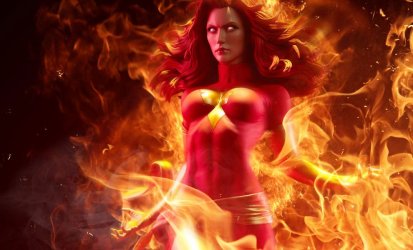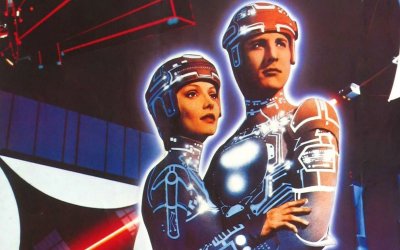- Sep 22, 2013
- 4,956
- 250
- 85
The release of films such as "The Wolf of Wall Street" [2013] indicates a modern age preoccupation with profiteerism-related spiritualism and pedestrian demonology.
Werewolf and vampire folklore dates back many years and represents a focus on body coordination mysticism, tracking extra-human powers, and supernatural hunting perception.
Modern genetics-related research has created a good deal of science-fiction imagination about speciation and species transformation, extending multi-terrain adaptation and even lifespan.
We know of stories of home medicine remedies regarding nutrition (i.e., Chinese men living to past 100 years of age due to a steady diet of wholesome rice). However, how does the shift between farming and economic networking (virtua-farming) create new storytelling about human resistance to mobility restriction-related biological limitations? Modern American comic book characters such as Hawkman (DC Comics) and Lizard (Marvel Comics) indicate a new curiosity about animal-like sensitivity in regards to agility, mobility, and unusual adaptation.
Such trends in psycho-sociology makes fertile ground for new age folklore surrounding, for example, aquatic werewolves, flying humanoid vampires, and Wall Street demon knights. While such folklore sounds like simple profiteerism omens, they are just as valid as the forest werewolf myths of the past.
If the ghost was the muse of the past eras of paranormal storytelling, perhaps the firefly is the muse of the present era.
Can a human transform into a firefly creature; can it develop bioluminescence? Can it develop glowing eyes?
Such questions provide a compass for new age paranormal folklore fit for the age of computers, lasers, virtual reality, eTrade, and cyber-warfare.
American horror films such as The Texas Chainsaw Massacre and Friday the 13th provide avatars that signify a new age fear of tool-use and fortune-hunting.
So perhaps the new folklore is about a ghost in the machine or a vampire that can shoot electricity.
That's why one of my favourite new age media avatars is Raiden, the supernatural electricity-wielding warrior from the Mortal Kombat fantasy-adventure video game franchise.
Are we prepared for engagements between a hypothetical vampire-knight and a prophetic cyber-demon army? Could an Internet virus transform into a shape-shifting mega-mind capable of exhibiting behaviours akin to a space-traversing ghost? These are the questions in the head of the new age paranormal investigative imagineer.
What kind of folklore is out there about ghosts haunting computers? Here are a few interesting links (I've also included background-relevant media links below):
1. Ghost in My Computer?
2. Haunted MacBook on eBay
3. Spirits use Computers?
Ghost in the Machine (Film)
Vampire Knight
Raiden


Werewolf and vampire folklore dates back many years and represents a focus on body coordination mysticism, tracking extra-human powers, and supernatural hunting perception.
Modern genetics-related research has created a good deal of science-fiction imagination about speciation and species transformation, extending multi-terrain adaptation and even lifespan.
We know of stories of home medicine remedies regarding nutrition (i.e., Chinese men living to past 100 years of age due to a steady diet of wholesome rice). However, how does the shift between farming and economic networking (virtua-farming) create new storytelling about human resistance to mobility restriction-related biological limitations? Modern American comic book characters such as Hawkman (DC Comics) and Lizard (Marvel Comics) indicate a new curiosity about animal-like sensitivity in regards to agility, mobility, and unusual adaptation.
Such trends in psycho-sociology makes fertile ground for new age folklore surrounding, for example, aquatic werewolves, flying humanoid vampires, and Wall Street demon knights. While such folklore sounds like simple profiteerism omens, they are just as valid as the forest werewolf myths of the past.
If the ghost was the muse of the past eras of paranormal storytelling, perhaps the firefly is the muse of the present era.
Can a human transform into a firefly creature; can it develop bioluminescence? Can it develop glowing eyes?
Such questions provide a compass for new age paranormal folklore fit for the age of computers, lasers, virtual reality, eTrade, and cyber-warfare.
American horror films such as The Texas Chainsaw Massacre and Friday the 13th provide avatars that signify a new age fear of tool-use and fortune-hunting.
So perhaps the new folklore is about a ghost in the machine or a vampire that can shoot electricity.
That's why one of my favourite new age media avatars is Raiden, the supernatural electricity-wielding warrior from the Mortal Kombat fantasy-adventure video game franchise.
Are we prepared for engagements between a hypothetical vampire-knight and a prophetic cyber-demon army? Could an Internet virus transform into a shape-shifting mega-mind capable of exhibiting behaviours akin to a space-traversing ghost? These are the questions in the head of the new age paranormal investigative imagineer.
What kind of folklore is out there about ghosts haunting computers? Here are a few interesting links (I've also included background-relevant media links below):
1. Ghost in My Computer?
2. Haunted MacBook on eBay
3. Spirits use Computers?
Ghost in the Machine (Film)
Vampire Knight
Raiden


